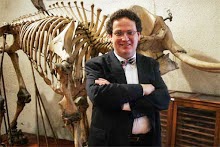There are of course competing goals in conservation. Are you concerned about ecological services? Evidence of phylogenetic history? Access to Nature's storehouse of answers to environmental challenges? George Will recently quipped that a great project like Hoover Dam could not be completed today as a public works program because an endangered minnow would be identified and bring the whole idea to a halt. There are times and places where a single species is so interesting or important that its preserveration should trump competing issues. There are other times and places where the Sophie's Choice should be made in order to save that trump card for an even more important moment.
As much as I wish we could save every species it is an unrealistic aim in the new world disorder. Our generation is going to oversee the extinction of hundreds of thousands if not millions of species and we can do so in one of two ways. We can pretend that our hands are clean and that we are just powerless witnesses to this biodiversity decimation and take our chances on some random outcome of the greatest species diversity bottleneck since the K-T boundary, or we can gather the fundamental taxonomic information necessary to make tough, but informed, choices and try to minimize the losses during this genetic dark age.
The only rational end game for conservation should be to maximize biodiversity as measured in phylogenetic and ecological diversity, not in simple numbers of species. Sustainable ecosystems are most probable given high levels of species diversity and if we knew enough about species and their distributions and relationships, we could prioritize the species, clades, ecosystems, and places most essential to a diverse and dynamic biosphere. This is, of course, a very imperfect approach but it is better than flying blind and accepting a random outcome.
Underneath our collective aversion to turning to objective science is an otherwise noble attempt to act as if all species had equal value. Such equality would be an admirable view were there no biodiversity crisis and were there even a remote chance of saving every species. Sadly, there are no such chances and clinging to policies that rest on such a false assumption is a dangerous path. Species are not equal. Losing Gingko biloba, the last living species of a branch of the tree of life, is a different proposition than losing one species of Atheta (a staphylinid beetle) in a genus with more than 2,000 living species that bear a remarkable resemblance one to another.
It is also disingenuous to pretend that current enforcement of species protection is anything like equal. Most endangered species are rare arthropods that no one has taken the time to get red listed, so we lavish protection on a handful of charismatic megafaunal species while ignoring invertebrates that may well be as or more important functional components of ecosytems.
Species are not equal in their contribution to phylogenetic knowledge, to ecological function, or to some other facet of biological diversity and we should not pretend in the middle of a biodiversity crisis that they deserve equal protection. This is PC heresy, of course, but it is good science, good public policy, and our last best hope for a sustainable biodiversity level that meets our future ecological service and intellectual curiosity needs.



No comments:
Post a Comment